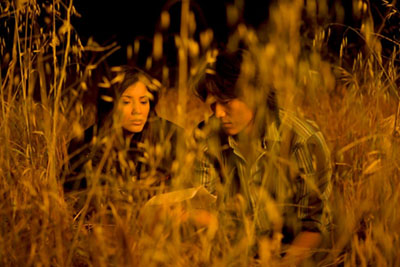Outer Limits: Chris Chan Lee's Undoing and So Yong Kim's In Between Days |
Two of the
Asian American selections at this year's Los Angeles International Film
Festival -- one a festival darling, the other a festival-darling-to-be -- offer
new and exciting ways to look at the Asian American indie. The question is,
will anyone actually notice?
Little ink has been spilled on the liminal spaces of Asian American
filmmaking, and for good reason; despite the best efforts of Justin Lin and
company, defining the epicenter, the pulse, the crиme de resistance is already an unenviable task. Consequently, filling
out the margins becomes mere guesswork: we don’t know what film noir has
anything to do with the Asian American film canon, except that it does, and it
has. Likewise with stories of the diasporic community --somewhere in
Two recent films screened at the 2006 Los Angeles Film Festival -- Chris
Chan Lee’s noir-of-sorts Undoing and So Yong Kim’s Jia Zhang-ke knockoff-of-sorts In Between Days -- attempt to fill this void, with varying
degrees of success. Of course, aesthetically, thematically, and
ideologically, they're worlds apart. And yet, both are invariably products
of the kind of film circuit naivete brought on by clueless distributors whose
idea of hardball marketing is retorting, "But is it Better Luck Tomorrow?"
Of the two, Undoing is
the more likely to catch on, if only because scenesters love beautiful people
doing dark, dirty things. A cast highlighted by NBT (Next Big Thing) Sung Kang,
Kelly Hu, and Russell Wong certainly fits the bill, though Undoing is far from one of those
actorly showcases that the IFC channel plays with such frequency. Sparsely
plotted, dimly lit, and glumly acted (with the notable exception of Russell
Wong, who dons the best Christopher Walken impersonation since, well,
Christopher Walken), Undoing is the sort of independent feature that earns pensive nods and existential
gestures, with virtually nothing in between. That inconspicuousness is one of
the film's strengths doesn't help its commercial outlook. Neither does the wide
array of jump cuts, which are disorienting without being compellingly so.
Still, it's an admirable effort, beginning with the audacious move to relegate
Asian America to a backdrop, not a social conscience. You can argue that
Koreatown in
Perhaps Undoing is too
preoccupied with not doing too much -- there's a certain world-weariness cast
over the film and its band of underachievers, and without the usual narrative
fussiness of the film noir to keep things brisk, we're often left with vacuity
instead of emotional veracity. After a while, the liminal spaces occupied by
the characters within the film begin to resemble its commercial prospects,
which, for a film that makes little ado about nothing, but is actually quite
extraordinary at it, seems too harsh a fate.
Though greeted by a chorus of hosannahs and endless Jia Zhang-ke
comparisons in the vacuum that is film circuitry, So Yong Kim's In Between Days is even more unassuming
and painstaking-for-the-sake-of-being-painstaking. It's readily apparent that
Kim has studied up on her long-take-auteurs and champions of cinema verite --
each frame is formally rigorous, each visual metaphor labored over and lingered
upon. The narrative is barebones immigrant-rite-of-passage plopped onto barren
landscapes and affectless dialogue, though Kim is decidedly more at ease in the
scenes where she observes her characters' tumult quietly. As for the Jia
Zhang-ke parallels, they're only partially accurate; Kim has a great deal of
the Chinese master's formal chops, but little of his subtlety, or even warmth
-- In Between Days, like its
setting, often feels glacial, especially when Kim decides to project ideas of
alienation through listless voiceovers and stolidly earnest gestures and
expressions. She fares better, however, with assimilation, experimenting with a
multitude of shots, varying in angles, distances, and tone that perfectly
capture both the confusion and the desire to impress.
The difficulty that arises, then, is one not only of identity, but
instinct. It's instinctive for a Korean Canadian filmmaker such as So Yong Kim
to make a film about the plight of the Korean Canadian immigrant. It also makes
sense that Chris Chan Lee, a native Los Angelian, would attempt to capture the
sprawled-out, scattered identity of the Asian American in Los Angeles, even if
he does so only peripherally. What's less clear is whether we, the casual
moviegoer, understand our own instincts well enough to decide whether films that
don't hoist the Asian American banner loudly and proudly should be understood
as such. All of which is a rather long-winded way of saying I hope that they
do. Because they are. Asian American, that is. And don't let any greasy studio
exec tell you otherwise.

